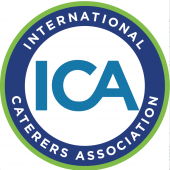The hospitality industry is one that’s diverse by nature. As hospitality leaders, it’s our job to ensure that everyone on our team, every vendor we work with, every client, and every guest feels welcome and cared for. That’s the crux of hospitality, after all.
But where do you begin?
During our December ICA webinar, KT McCalla, hospitality and events manager for Dutzel's Catering & Events in Kansas City, led an important session on exactly this. They eloquently and thoroughly shared the steps to take to start cultivating a culture of diversity, equity, and inclusion (DEI) in your hospitality business.

KT McCalla, hospitality and events manager for Dutzel's Catering & Events. Photo courtesy International Caterers Association
Dutzel’s Catering and Events is the only certified LGBTQIA+-owned catering company in the Midwest. They prioritize DEI in every facet of their business—both internally and in every event they produce—making them uniquely qualified to teach others in our industry how to approach this sensitive yet highly important topic.
McCalla encouraged all participants to keep an open mind and approach DEI from a place of curiosity and openness, sharing that, “At the start, growth does not happen in your comfort zone, and if you're uncomfortable, you're learning.”
So, let’s learn, shall we?
The goal of building an inclusive organization
Building an inclusive organization is not only the right thing to do—it’s also the best way to ensure that your team feels safe, secure, and seen within your organization, which should be a priority for all hospitality leaders. We all know that when you take care of your team, they’ll take care of your business.
The following steps are ones that you can begin today, tomorrow, and the next day to really get started on your journey to DEI.
Step one: audit your business
The first step to cultivating a culture of DEI in your hospitality business is a simple audit. Just as you audit your sales for the year, you need to be auditing your level of inclusivity multiple times a year.
Don’t miss the ICA during Catersource Conference & Tradeshow
Stop by the ICA Inspiration Zone during Catersource Conference & Tradeshow 2024 to join friends, peers, and colleagues.
Here’s what you need to look for:
-
Do you incorporate inclusive language in your employee manuals and onboarding materials, your web copy, your sales and marketing content, your contracts, and your menus?
Not only should you be looking for language that excludes people of diverse races, ethnicities, religions, etc., but you should be looking for unnecessarily gendered language, as well. For example, bride and groom versus partner or spouse, bridal suite versus wedding suite or ready room, Mr. and Mrs. versus Mx. to start.
-
Are your venues and facilities accessible and fully updated for ADA compliance?
This doesn’t just mean your own facilities but also the vendors and venues you work with as well. While it’s required by law, auditing isn’t common, so sometimes things slip through the cracks.
-
Are your website and social media written with readability in mind?
Add image descriptions on your social media and your websites to make sure that folks using assistive devices, whether they are blind or hard of hearing, can access your information and learn about your business. Remember, this leads to spending money with your business!
-
Do you have gender-neutral restrooms?
The line for the women's restroom is always 10 times longer than the line for the men's restroom. Not only can you ensure that everyone feels comfortable, but you can enhance your guest experience with gender-neutral restrooms!
-
Are your uniform policies inclusive?
Do you have unnecessarily gendered uniform policies? Is your policy about how the team can wear their hair discriminatory? Take a look at all of those things and make sure that they are inclusive to everyone and what everyone might be facing when they enter the door or when they enter an event.
-
Is your social media representative of your DEI goals?
Who are you posting? How many scrolls does it take to come across a person of color or an LGBTQIA+ couple?
-
What does your vendor list look like?
Do you have local minority-owned, women-owned, LGBTQIA+-owned businesses on your roster? If not, make changes.
Step two: establish your ‘why’
Now, depending on what you find, there may be a significant number of changes required to the way you operate and show up. And that’s okay—the important thing is you’re doing the work! In the interim, though, it’s important to share with your team why you’re making these changes. This is what sparks culture change.
Who are you?
What do you stand for?
Share this.
You’ll see your team grow more rapidly, and your internal culture will be more positive as it begins to be reflected throughout the organization. This leads to retention of top talent and simpler hiring!
Step three: create an inclusion statement
Now that you've done an audit, made corrections, defined your position, and defined your why, you can put this into a tangible statement, document, or presentation to share with your employees and clients on your website.
It can be as simple or as complex as you desire.
For example, here is Dutzel’s inclusion statement:
Dutzel’s Catering & Events is intentionally developing a culture which welcomes and holds space for employees and clients to bring their authentic selves to the table. Our people-first approach fosters creativity, promotes inclusion, amplifies voices, supports positive relationships, inspires a safer industry, and actively cultivates an equitable, dynamic workplace to serve and support all people. We are dedicated to continued education from the top down, striving for progress not perfection.
Step four: hire a consultant
As McCalla mentioned throughout the webinar, we're not all going to know everything. And that’s okay. But it is important to hire a professional who will help you fill in the gaps. One who can help you address elements of DEI that you may have missed, ensure you’re filtering policies and action items down throughout the organization, and share different elements of DEI you may not have experience with.
Step five: create your workplace manual
Using everything you’ve gleaned and implemented from the steps above, it’s time to put it into physical form to incorporate in your onboarding, annual reviews, and every area of your business. McCalla suggested that DEI initiatives can still be off-putting to some. There’s a lot of overwhelm associated with it. So, at Dutzel’s, they simply call their DEI manual a workplace manual. It makes it more accessible and digestible for all.
It can incorporate:
- Your DEI mission statement
- Your inclusion statement
- A glossary of terms
- The Gender Unicorn visual
- Pronoun examples
- How to identify a person’s name and pronouns
- Dos and don’ts for DEI
- Inclusive language and signage guides
- Resources for DEI within your organization and resources they can use on their own
Glossary of terms for your DEI manual
These are the terms Dutzel’s has incorporated in their manual to provide a starting point for your team:
LGBTQIA+ - Spectrum of Gender & Sexual Diversity. Lesbian, Gay, Bisexual, Transgender, Queer, Intersex, Asexual, +.
- Sex (n) - Either of the two main categories (male and female) into which humans and most other living things are divided on the basis of their reproductive functions.
- Gender - The male sex or the female sex, considered with reference to social and cultural differences rather than biological ones, or one of a range of other identities that do not correspond to established ideas of male and female.
- Gender Binary - A system of gender classification in which all people are categorized as being either male or female.
- Cisgender - Relating to a person whose gender identity corresponds with the sex registered for them at birth; not transgender.
- Transgender - Relating to a person whose gender identity does not correspond with the sex registered for them at birth.
- Non-Binary - Having or relating to a gender identity that does not conform to traditional binary beliefs about gender, which indicates that all individuals are exclusively either male or female.
- Deadname - To call a trans or non-binary person by their birth name when they have changed their name as part of their gender transition.
- Misgender - Using a word, especially a pronoun or form of address, that does not reflect a person’s gender identity.
They also shared this incredibly helpful glossary for inclusive wedding language:
This is just the beginning. But even small steps can cultivate an environment where your team, clients, guests, and vendors feel safe, secure, and seen. We all deserve to feel that way wherever we work or do business!
Your role in DEI as a hospitality leader
An important reminder McCalla shared is to “Approach DEI with a mindset of compassion, not comprehension. You won’t ever fully know everything. You won’t understand the experiences of others. You won’t always know the right answers or the right way forward. But you can always have compassion for where people are coming from. This is the best place to start on your journey to DEI.”
As leaders in a diverse industry, your team is coming to your table with all different life experiences. You don’t need to be the expert in the barriers they may be facing, but you must have compassion for what they’re up against in this world.
Ultimately, it’s up to us as hospitality leaders to create safe spaces that don’t add to those barriers or reinforce them.
DEI learning resources for hospitality leaders
A big thank you to KT McCalla and the Dutzel’s team for sharing their incredible approach to cultivating an inclusive workplace. Should you have any questions, they welcome them via email at [email protected]. You can also use the following resources:
- Equally Wed Pro (certification course by ICA members Kirsten Palladino (she/her) and Maria Palladino (she/they))
- The Trevor Project
- Human Rights Campaign
- National Center for Transgender Equality
- GLAAD
And, as always, you can ask your ICA colleagues. We are dedicated to diversity and inclusion in our organization and aim to provide learning resources, scholarships, and more to ensure our industry is a leader in DEI.



